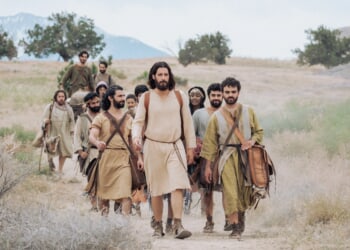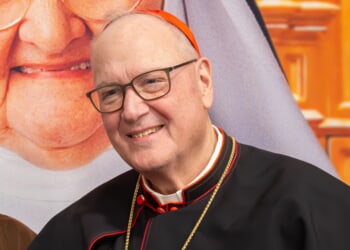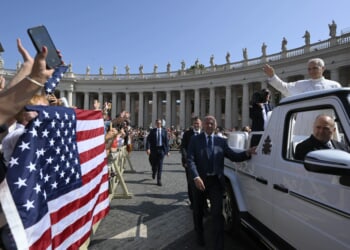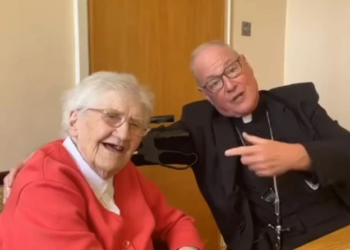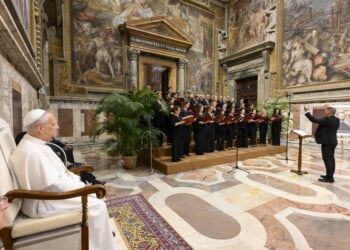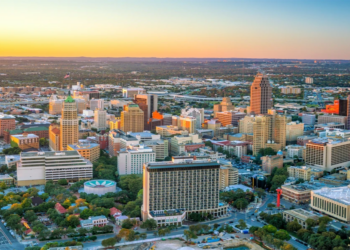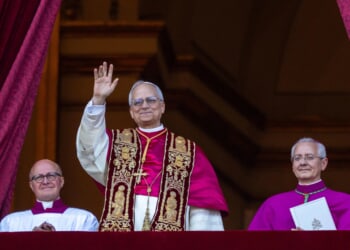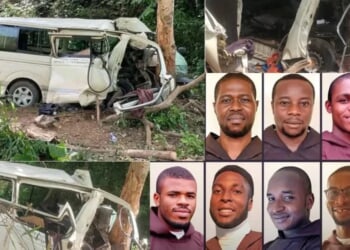CNA Staff, May 7, 2025 /
14:30 pm
The 2025 Conference of the Society of Catholic Scientists (SCS) will take place June 6–8 at The Catholic University of America in Washington, D.C., with several talks set to address the origins of the human race from scientific, theological, and philosophical perspectives.
Stephen Barr, a physicist at the University of Delaware and founder of the group, told CNA he expects this year’s convention to attract approximately 150 attendees, including a significant number of young participants, mainly graduate students. The SCS has grown to over 2,000 members worldwide since its founding in 2016, with its first annual conference taking place in 2017.
Key topics this year include studies on the human mind, free will, and the relationship between neuroscience and philosophical views on human nature. In addition, three separate talks on human origins will explore the Catholic Church’s views on evolution.
On the society’s website, the SCS describes itself as an answer to the call of St. John Paul II that “members of the Church who are active scientists” be of service to those who are attempting to “integrate the worlds of science and religion in their own intellectual and spiritual lives.”
He said one of the main goals of the SCS annual conference is to be a place where Catholic scientists meet one another and have spiritual and intellectual fellowship.
“[W]hat we want to do is break that vicious cycle and show the world and each other that there are a lot of religious scientists … There are a lot of Catholic scientists out there,” Barr said.
“I think our organization will help younger Catholics in science see that … they’re part of a very large community” and will help them to “overcome their sense of isolation [and] make them more confident.”
Barr previously told CNA that despite the large numbers of scientists who are religious, many of them likely feel they cannot share their faith openly in their workplaces. Despite the Church’s long-standing support of science, Barr said he still encounters the misconception that most scientists are atheists.
“[R]eligious scientists tend to be a little quieter and maybe more cautious because they’re playing it safe … You keep your head down a little bit. Why invite trouble?” he said.
Last year’s conference, held at Mundelein Seminary northwest of Chicago, focused heavily on artificial intelligence. Barr said this year’s event will feature a variety of topics rather than focusing on just one. While most of the speakers are highly trained scientists, “fully a third of the talks” will be given by theologians or philosophers, Barr noted.
Philosopher and Dominican Father Anselm Ramelow will discuss “Free Will, Aquinas, and the Brain,” addressing claims from neuroscience suggesting humans might not have free will and are merely “machines.”
Renowned Harvard mathematician Martin Nowak will present a talk on “Does Mathematics Lead to God?” — the first time an SCS conference has featured a talk specifically on mathematics, Barr said. And a cosmologist from Arizona State University, Rogier Windhorst, will discuss the James Webb Space Telescope and what it has discovered since it launched in late 2021.
The conference will also feature an after-dinner talk by Ross Douthat from the New York Times, a Catholic convert who will discuss his new book “Believe: Why Everyone Should Be Religious,” which references scientific evidence through a religious worldview.
The 2025 conference is open to both SCS members and nonmembers and will be livestreamed for free.
Barr said the talk given by Kenneth Kemp, whose forthcoming book examines the Catholic Church’s view of the evolution of the human race, is deeply connected to questions about the soul and what distinguishes humans from other animals.
“This is one of the big perennial questions. The question of whether we have souls,” Barr said.
(Story continues below)
Subscribe to our daily newsletter
The event will feature a discussion on Neanderthal personhood and its potential implications for the history of humanity and for people of faith. Neanderthals, a species of humanoids that went extinct about 40,000 years ago, are thought to have been outcompeted by modern humans.
“Did they have language? Did they have reason? … If Neanderthals had rational souls, that would push the beginnings of humanity back [to] 600,000 years ago instead of 200,000 or 300,000. It’s an interesting question,” Barr said.
University of Pittsburgh scientist Mark Saxen will rigorously examine near-death experiences in his presentation. Kelly Kearse, a science teacher at Knoxville Catholic High School, will examine Eucharistic miracles from a scientific standpoint.







